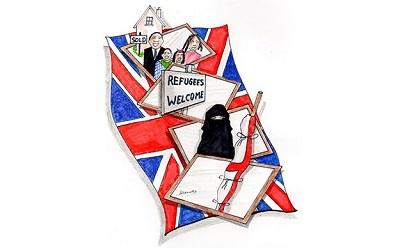Day 212, Year of #Mygration: What is this political space we call 'immigration'?

Today we share an article originally published in 2015 on openDemocracy and later shared on the OU's OpenLearn platform by Dr Steve Garner, Head of Criminology and Sociology at Birmingham City University. In it, he explains his research exploring four frames that inform how ‘white Brits’ perceive and understand immigration.
Four frames white people in the UK use to understand immigration
Immigration is a flypaper issue: all kinds of anxieties about a variety of problems get stuck to it. The people I have been listening to in interview-based research projects over the past decade use it as a device through which to express losing their place in the world, being abandoned by government to their struggles over dwindling, stigmatised social housing, employment, and the ways they now perceive themselves to be at a disadvantage relative to migrants and other ethnic minorities. I have placed ‘perceived’ in italics: perception is everything. Statistics do not support these claims of ethnic disadvantage. Indeed, to take just one figure from many, Black and Minority Ethnic households were, prior to the 2008 recession, 40% more likely to be in income poverty (i.e. with incomes below the poverty line) than white UK ones (Platt, 2007 ).
Moreover, despite the frequent assertion that immigration has a set of negative impacts on employment, housing and other resources, my starting point is that immigration is neither the sole nor the direct cause of these outcomes. In this set of three articles, I’m going to move from how people read immigration, to the role of integration in the immigration discussion, and finish with some ideas on the future of immigration as a political topic.
After researching how white UK people in provincial English towns talk about social identities and entitlement , in a set of projects spanning 2005-2011, one conclusion is that the ‘immigration’ people talk about does not correspond to the nuts and bolts of immigration policy; the number of people actually entering and leaving Britain; who actually claims benefit; who pays taxes; or how to fill gaps in the labour force. People instead tend to understand ‘immigration’ through a set of overlapping frames. These are shaped simultaneously around nation, ‘race’ and class (among other things), and I use the term ‘discourse’ below as shorthand to describe the contents of, and set of parameters to, the ways in which ‘immigration’ is discussed in the broadest sense.
‘Immigration’ as a sticky political space
Imagining ‘immigration’ as a sticky and amorphous political space rather than a very focused topic is a more fruitful way to proceed. The idea of stickiness comes from the work of Sarah Ahmed , who suggests that emotions and ideas become stuck to bodies in the development of discourse about identities. The ‘immigration’ that people discursively construct lies some distance from the arcane arguments about border-crossing regulations and statistical impacts on the economy that engage policy-making circles. This is partly a reflection of information circulated in the public domain. The minutiae of immigration policy (a highly specialist and dynamic area) are not what most people engage with. For many, it is newspaper, television and radio news headlines with no explanation of contexts provided, conversations and social media threads.
Four frames
Out of the more than 400 semi-structured interviews that comprise the data for the projects have emerged a set of patterns about the way people talk about identity. ‘Frames’ are drawn from the work of Erving Goffman . When confronted with social situations, he argues, we do not invent a set of guidelines for how to understand it, or how we should behave, but instead fit information into guidelines into which we already have been socialised. This principle has been developed in communications theory about how the media sets agendas .
Discourses can be conceptualised as containing several competing and/or overlapping frames. An example would be the frames used in exchanges regarding media freedoms after the Charlie Hebdo murders, which reproduced and challenged arguments about the meaning of those events. I should emphasise that there are more frames out there than four, but I am working here only with what emerged as the most frequently recurring patterns in our interviews. They also overlap to some extent, so they are distinguished neatly only for analytical purposes.
The four frames are: unfairness, political correctness gone mad, integration and repressed Englishness. This is how their logics run for the people who use them:
Unfairness
‘… if I wanted to go out and get a house or get a flat, I would be put further down the list for someone that is not a British citizen to say, someone that has come over into the country. They get everything handed to them and it’s people that have been living in this country since they were born that are not getting the same benefits as other people in this country’ (Adam, Bristol).
The policy theme of ‘fairness’ was adopted by the Conservatives in 2010. Most of our respondents would probably see this as reflecting some of their concerns. They see the ‘equality agenda’ as having long outlived its usefulness. Ethnic minorities are now advantaged in the country’s resource allocation, runs the logic, so why are there still special benefits for them? Claims of ‘unfairness’ suppose that the order of ‘fair’ entitlement has been overturned. The notion of ‘fairness’ would therefore involve returning to a pre-‘equality’ era logic, where membership of the nation and local community through bloodlines is a principal determinant of access. Even then however, there are other individual white UK people who are ‘playing the system’ in various ways, to get resources to which they should not be entitled.
Political-Correctness-Gone-Mad
Central to all the discussions of unfairness and political correctness (PC) is the State, as distributor and adjudicator. This frame assumes that ideological support for equality and the self-defeating elite-led project of multiculturalism is excessive, systemic and resistant to questioning. The allocation of material resources seen as unfair is thus enabled and perpetuated by PC: not as an aberration, but as business as usual.
‘I’m apprehensive about, I mean, the whole political correctness thing. And I mean, we’ve got a tradition of being a nation that welcomes refugees and that kind of thing, but because of the situation that we have at the moment and the, you know, influx of asylum seekers, there does seem to be such an emphasis on not offending certain races and religions that maybe we’re in danger of losing, not losing, but not helping the indigenous people and indigenous traditions….’ (Sally-Ann, Plymouth).
In these zero-sum scenarios, there is a statement of distance from the political and cultural elite who produce pc (underlining the speaker’s ordinariness and common sense); and the victimhood of the abandoned white indigenous subject. PC is thus the legitimising ideological system accompanying the ethnic reallocation of material and cultural power.
Integration
Integration is the discursive pivot between immigration and nation. It is an intensely contested idea. The majority of interviewees posited ‘assimilation’ (one-way movement) rather than a two-way street: and see the white UK group as the ones giving things up without reciprocal actions. The process of integration is constructed as a simple matter of choice on the part of an incoming migrant, while this ‘migrant’ status is often stretched to cover people who are not migrants but the children or grandchildren of migrants. Failure to integrate is expressed through clothes, language and self-segregation. There will be much more on integration in the next article as it is the crossover point of the four frames and has so many implications for the direction this discussion will take.
Repressed Englishness
People in general appear deeply ambivalent about Britishness. Politicians seem much keener than the governed . Our interviewees say ‘anyone’ can access Britishness, including ‘the non-British who are now British’, as one of them succinctly puts it. Moreover, there is a noticeable frustration with the perceived lack of space available for celebrating English identity compared to the other UK nations. I interpret this trend as a retreat towards Englishness because it represents something smaller and more exclusive, rather than a sprawling open space that migrants can be part of if they live here long enough. Indeed, the perception of Englishness as ‘whiter’ and Britishness as a more diverse space seems shared by BME groups, which we will look at more closely next time.
Conclusion: The ‘beleaguered nation’
So this political space of immigration is set in a ‘beleaguered nation’. There are indeed plenty of reasons for people to feel beleaguered and abandoned, at a moment of widening inequalities , when the implications of ‘austerity’ as a set of economic principles become more widely felt, and people’s political engagements become simultaneously more local, more global and less linked to formal party politics. However, the significant role of the immigration frames noted here is to provide a convincing way of making social transformation intelligible. These frames provide a means of articulating social change as trauma, enabling a number of deleterious impacts to thus be traced back to immigration exclusively, as if these outcomes were mono-causal. Immigration in this discourse thus unequivocally ‘equals’ unemployment; housing shortages; health service issues and overcrowded schools. Yet broader, long-term structural problems generated without the contribution of newly-arrived immigrants are covered over in this narrative. Moreover, immigration talk ‘racialises’ the topic. It first ignores the patterns of discrimination that still exist and claims that white UK people are disadvantaged because they are white. Second, it develops ideas that groups of people are entirely culturally and geographically distinct from one another, instead of mixed in complicated relationships to place, power, and history. My interpretation is these justifiable feelings of frustration and abandonment are not derived from immigration per se, but from the discourse on ‘immigration’: a distinction that means the consequent concerns may well be impervious to attempts to address them using statistics, and / or accusations of racism. Such efforts will probably have perverse effects.
Contact our news team
For all out of hours enquiries, please telephone +44 (0)7901 515891
Contact detailsNews & articles

OU researchers lead international advances in planetary protection
Open University researchers are leading international advances in planetary protection, helping ensure that space exploration is safe, sustainable, and scientifically rigorous.